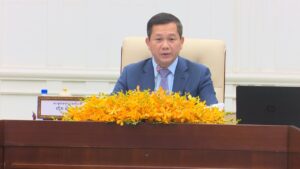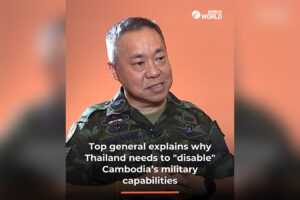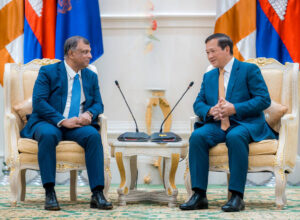(1) Modernization of education is not only about buildings but each room must be comfortable and standardly equipped
Allow me to convey to you the best wishes from Samdech Techo and Samdech Kithipritbundit. In his time as the Prime Minister, Samdech Techo helped this school a lot […] for example, there are six schools built in succession under the time of Samdech Techo owing to the increase in students. We have no choice. One option is to build a college in a separate location, which is also difficult because students had to travel far. If there is no place nearby for a separate location, we have to go far. On that note, to save the trip to a far place, we can only build (tall) buildings in the same location […] This is the development for the people’s needs. Modernization is not only about buildings, not just about how many rooms, but each room must be comfortable and equipped with standard equipment for children to learn […] Going forward, we will strive to make children able to grasp technology at some level from their early grades […] The goal of the education sector is to strengthen from the ground up, not waiting for college or high school to learn computers […] The state invests or works with private partners, development partners in this work. Noticeably, there has been an innovative effort by the Ministry of Education, Youth and Sports […]
(2) New-generation school is successful formula but model school is effective too
In some places, we are setting up new-generation schools, a kind of school that the state invests in. We have the participation of partners and parents […] We are trying to find a formula (to strengthen this basic education), since the expansion of new-generation schools is limited for the high cost […] We have 11 new-generation schools so far. I have eliminated what we called the modern learning centers. We are not eliminating the new-generation schools. The new-generation schools are a successful formula where the state and the community work together to support state-run schools to teach students. However, it is not necessary to only have new-generation schools. We will try to modernize to some extent (by considering) other methods. There are some model schools that (can be effective without) necessarily following the model of (new-generation schools). We are testing some schools by investing more in extra-curricular teaching or extra hours so that students can study more. We do as much as we can […] When our ability increases, we will provide better primary and secondary education. Both levels are 12 years, from primary to 12th grade, with a solid foundation, and going to university is no longer difficult […]
(3) From mandate to mandate, work for better results for the people and give children a better future
We are building more (study facilities) so that the next generation will have better opportunities (for education) […] For my generation, my parents went through war and didn’t have a chance (to provide us education access). They are happy now when my generation learned. My generation will also give my children a better future than mine […] This is the heart of parents. The Royal Government is the same. From generation to generation, from mandate to mandate, together we want better results for the people […] Education is not just about (having) infrastructure. We are talking about the curriculum, about the means of learning, about teachers, about the care in creating, the participation of students, and about parents. If there are schools but there are no students, no teachers, no parents, it is difficult. We must solve the problems of the people’s livelihood so that their children don’t drop off classes/schools […] and there must be safety, stability, and security because it is related to education […]
(4) Quantity in education ensures opportunities for children to receive education while quality is about reform and modernization
Ask yourself what opportunities do you want your children to have? Every parent wants their children to have the opportunity to learn so that they can work in the future and support themselves and their parents. The importance of building human resources for a nation is the same. We cannot do much by ourselves, independently, if we do not have human resources who can work effectively and efficiently […] By training human resources, we must look at two factors – quantity and quality. By quantity, it does not only mean to have a lot of infrastructure, but also providing opportunities for children to receive education […] as an inclusive outcome. We build and expand schools everywhere. Samdech Techo said – “don’t let the next generation have the same difficulties as my generation when I was young” […]
For quantity, we are making children learn a lot, learn for a long time, and learn all the way […] quality is about reform and modernization of education, which the Ministry has worked hard to reform the education system, for instance the effort to set out STEM (science, technology, engineering and mathematics) curriculum […] and by decentralizing some rights to the provinces, while the standards and regulations are linked to the Ministry of Education (Youth and Sports – MEYS) to ensure the consistency of education […] We are talking about adjusting the leadership structure and policy of the MEYS, but in schools we constantly adjust and modernize the curriculum […] What we are learning does not respond to what is happening (completely) […] Building people for the next four or five years requires a vision to be right […] Learn today, get results tomorrow. We say “planting in school, fruiting in society” […]
(5) Without teachers, no matter how modern a school is, no teaching can be done
The Ministry of Education, Youth and Sports, the Ministry of Public Service (Ministry of Economy and) Finance have considered improving the basic support package (to) find other ways to provide opportunities (to attract) teachers to go (to teach in remote areas) […] The main problem is how do we spread the teachers. The spread of schools is not just the spread of buildings. The biggest problem is the spread of teachers. Without teachers, no matter how modern a school is, no teaching can be done. Without buildings, as long as there are teachers, teaching can be done […] That is why efforts are being made to consider the qualifications of teachers, attracting them, providing incentives from the time they become teachers trainees until they retire, plus preparing good physical infrastructure not only for students but also for teachers […]
(6) “Strengthening rather than expanding” – expanding when/where it is necessary
What is the goal of strengthening education? The goal is to strengthen education at all levels, from kindergarten to higher education, which has been done since the fall of the Pol Pot regime until present, and into the future. Among them, there are some pillars that need to be accelerated […] This year, this mandate, we take the approach of “strengthening rather than expanding”. Expand only when/where it is necessary. Each school must be strengthening on the spot. In the education sector, we have many levels, but we are strengthening primary education up to grade 12. We will continue making additional efforts to build up pre-schooling capability. We are preparing […]
(7) Visiting schools to gather information and think of ways to improve education
To strengthen the education sector, we have established the National Committee for Promoting the Implementation of Key Measures in the Education Sector (NCPE), looking into the 12 years of education, but in the first term, we focused on pre-primary education […] I visited two or three schools […] met, sat and listened to parents to […] in the purpose of 1. gathering (information from them) […] 2. pondering on it in order to (a) strengthen the school governance […] (b) review and adjust the curriculum and extracurricular activities in line with the program to strengthen morals and behavior […] (c) pay attention to the health of students and (d) promote the participation of parents, guardians, and communities in education in line with the slogan or approach of partnership between the state and the community for education […]
(8) Good deed deserves protection and help from the people
During the 2013 election campaign, I was driving at night from Tbong Khmum to Kang Meas of Kompong Cham, crossing a quiet road under rain […] the car skid off the road […] An uncle came out of his house in the village. He came close and saw me. Suddenly, he disappeared. Ten minutes later, a group of villagers appeared and they came to help push the car. I said, “thanks to the good deed (we did,) we got the protection and help from the people.” The teachers who are doing a good job to help teach the children, the people will love you too […] taking this opportune moment, I am urging our children to stay away from drugs. They should work and study hard while parents support and sacrifice […] let them invest only their physical strength, not their mental strength […] If you are not lazy and studying well, you are performing good merit for your parents […] Celebrate with the same with the teacher. Don’t make it difficult for the teacher, listen to the teacher, study well, get as many A’s in the exam as you all can […]
(9) Visits will be made to health centers and/or modern agricultural communities
There are still hundreds of schools across the country built under the leadership of Samdech Techo over the years but have not yet been inaugurated yet. We may not be able to inaugurate (all) 900 of them […] We will choose some large schools to inaugurate as a symbol of collective achievements […] and we will try to meet more teachers and students […] not just to see the schools. The other day, I told the Minister of Health, HE Chheang Ra, to prepare a list of health centers/district referral hospitals that have been modernized over the past year […] to operate 24 hours a day […] Since I went to inaugurate Samdech Techo Hospital at the end of 2023, I have increased the quantity and quality of medicines, focusing especially on high blood pressure for (providing to patients from) distant provinces so that they do not have to come too frequently to get them […] I will also go see other projects such as modern agricultural communities […]
(10) Clarifying concept about how to get a medical DES
Let me clarify once again issue regarding DES (Diplômes d’études spécialisées de la discipline MÉDICALE) that has been misinterpreted. The issue of improving the quality of medical school education […] that learning to get a DES or a physician specialties does not require study (the general medicine) for eight years, but only six years (plus 4 years of specialization). Journalists who may not understand about DES wrote – “the Prime Minister gave a formula to strengthen medical education to study for six years, not eight years” […] In fact, there are two types of doctors – general doctors and specialist doctors […] Previously, you had to study for 12 years, which means studying (to be a general doctor) for eight years before taking the entrance exam for another four years to be a specialist doctor. So, in all, s/he studies for 12 years – (eight years) to become a general doctor and (another four years to become) a specialist doctor. Later, there was a reform, with most general doctors studying for eight years, of which two years are spent on an internship at a hospital, plus taking some classes at school. There was a thought that if you study for a specialty, you don’t need to study for two more years (of the eight years). You just study for six years, then take the entrance exam for a specialty, where you will study for four years, a total of 10 years. Not 12 years […]
There has been evaluation that those who studied 10 years (six years to become a general practitioner plus four more years to become a specialist doctor) lack experience […] The Minister of Health discussed among the leaders in the ministry and the school about whether they should bring back the 12 years (curriculum) […] I gave them an idea not to take that option yet […] I urge them to consider other options. It was not an order. There are two options – a) some may want to study for a general doctor for eight years, and go on to a specialty after they finished and b) some people don’t need to study for a general doctor for eight years. They only study for six years without getting a general doctor, but they study for a specialty and get a single degree […] I think the second option should be kept as it is. The first option is perfect for those who can complete the eight years study. However, there is a second option to consider […] We should keep the six-year study (of general medicine), after which students can go on to study another four years for a specialty, in which we could incorporate modules in the last two (of eight) years into the four years they study for becoming a specialist doctor […]./.






